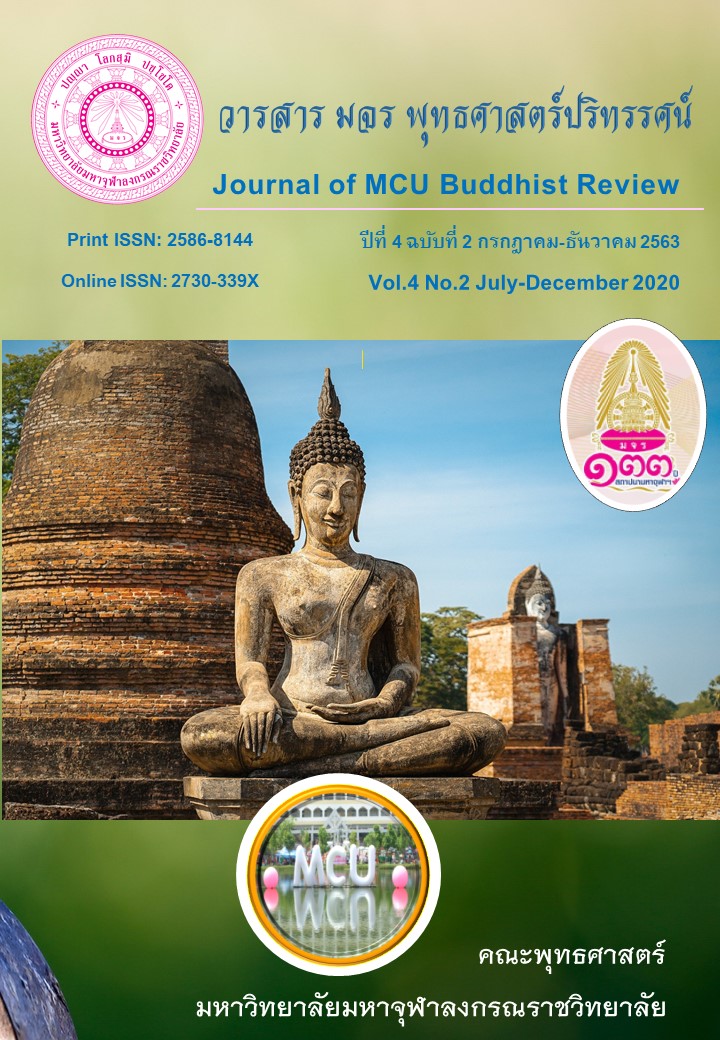แนวทางแก้ปัญหาในองค์กร SME ในสังคมไทยตามแนวอริยสัจ 4
Main Article Content
บทคัดย่อ
บทความเรื่องนี้เป็นการศึกษาเรื่อง การหาแนวทางในการแก้ปัญหาเพื่อสร้างความมั่นคงให้กับองค์กรธุรกิจ SME ไทยตามหลักอริยสัจ 4 ใช้วิธีเชิงพรรณนาโดยวิเคราะห์สถานการณ์ปัญหาของธุรกิจ SME ไทยในปัจจุบันและประยุกต์แนวการแก้ไขปัญหาจากเนื้อหาในพระไตรปิฎกเป็นหลัก จากการศึกษาพบว่า การบริหารจัดการธุรกิจ SME ไทยให้มั่นคง จะช่วยส่งเสริมให้ระบบเศรษฐกิจและสังคมไทยในภาพรวมดีขึ้น หากธุรกิจ SME ไม่มั่นคงจนต้องปิดกิจการ ย่อมสร้างปัญหาให้กับพนักงานทุกคนในองค์กร นอกจากนี้การที่ธุรกิจ SME เป็นธุรกิจหลักที่สำคัญมากในระบบเศรษฐกิจของประเทศไทยในยุคปัจจุบัน หากธุรกิจ SME มีปัญหาไม่มั่นคงจนต้องปิดกิจการ ย่อมส่งผลกระทบต่อการจัดเก็บภาษีของรัฐบาลอีกด้วย
การใช้หลักพุทธธรรมตามหลักอริยสัจ 4 ในการเสริมสติ สร้างสมาธิ เพื่อให้ผู้ประกอบการและพนักงานในทุกระดับของธุรกิจ SME เป็นคนดี มีปัญญาที่จะรู้ความจริงของชีวิต ไม่ถูกอกุศลมูลเข้าครอบงำ จะส่งผลที่ดีมาสู่คุณภาพการทำงานของทุกคนในองค์กร และช่วยส่งเสริมภาพลักษณ์ที่ดีให้กับธุรกิจ แนวทางในการบริหารธุรกิจ SME ของผู้ประกอบการที่มีคุณธรรม จะทำให้การนำหลักพุทธธรรมมาปรับใช้ในองค์กรบังเกิดผลได้อย่างเป็นรูปธรรม ถ้าทุกคนในองค์กรสามารถปฏิบัติตามหลักพุทธธรรมจนสามารถที่จะ ลด ละ ความโลภ โกรธ หลง ความคิดที่ต้องการเป็นของเราและการยึดติดตัวตน ก็จะได้เปิดใจรับฟังความคิดเห็นใหม่ๆ ที่ดีเพื่อเพิ่มแนวทางในการปรับปรุงคุณภาพการทำงาน รวมทั้งเป็นการสร้างทัศนคติที่ดีต่อองค์กรและเพื่อนร่วมงานอันจะนำไปสู่การพัฒนาองค์กร SME ให้มั่นคงได้ตามที่ทุกคนมุ่งหวัง
Article Details
- บทความที่ได้รับการตีพิมพ์เป็นลิขสิทธิ์ของวารสาร มจร พุทธศาสตร์ปริทรรศน์
- ข้อความใดๆ ที่ปรากฎในบทความที่ได้รับการตีพิมพ์ในวารสาร ถือเป็นความรับผิดชอบของผู้เขียนบทความ และข้อคิดเห็นนั้นไม่ถือว่าเป็นทัศนะและความรับผิดชอบของกองบรรณาธิการวารสาร มจร พุทธศาสตร์ปริทรรศน์
เอกสารอ้างอิง
กรมพัฒนาฝีมือแรงงาน. (6 กันยายน 2559). ขับเคลื่อนยุทธศาสตร์พัฒนาทักษะคนทำงาน 4.0. สืบค้น เมื่อวันที่ 8 สิงหาคม 2561 จาก www.mol.go.th/content/productivity-sme.
ตลาดหลักทรัพย์แห่งประเทศไทย. (2 ตุลาคม 2552). วิเคราะห์ปัจจัยพื้นฐาน. สืบค้นเมื่อวันที่ 8 สิงหาคม 2561 จาก www.set.or.th/education/th/begin/stock_content04.pdf.
พระพรหมคุณาภรณ์ (ป.อ.ปยุตฺโต). (2538). พจนานุกรมยุทธศาสตร์ฉบับประมวลศัพท์. กรุงเทพมหานคร : มหาจุฬาลงกรณราชวิทยาลัย.
พาโบล อูเชา. (8 กุมภาพันธ์ 2560). ถอดบทเรียน 10 ปีวิกฤตการเงินโลก. สืบค้น เมื่อวันที่ 8 สิงหาคม 2561 จาก www.th.talkingofmoney.com/case-study-collapse-of-Lehmanbrothers.
มหาจุฬาลงกรณราชวิทยาลัย. (2539). พระไตรปิฎกภาษาไทย ฉบับมหาจุฬาลงกรณราชวิทยาลัย. กรุงเทพมหานคร: โรงพิมพ์มหาจุฬาลงกรณราชวิทยาลัย.
สาโรช บัวศรี. (2526). วิธีสอนตามขั้นทั้งสี่ของอริยสัจในการศึกษาตามแนวพุทธศาสตร์. กรุงเทพมหานคร : สำนักคณะกรรมการวัฒนธรรมแห่งชาติ.
สำนักงานคณะกรรมการนโยบายเขตพัฒนาพิเศษ (สกอพ.). (4 กันยายน 2550). การลงทุนอุตสาหกรรม. สืบค้นเมื่อวันที่ 8 สิงหาคม 2561 จาก www.eeco.or.th/การลงทุน/อุตสาหกรรมที่ได้รับการส่งเสริม.
สำนักงานส่งเสริมวิสาหกิจขนาดกลางและขนาดย่อม (สสว.). (2551). การสร้างศักยภาพในการแข่งขันของ SME ไทยด้วยนวัตกรรมและการตลาด. สืบค้น เมื่อวันที่ 8 สิงหาคม 2561 จาก www.sme.go.th/th/cms-detail.php?modulekey=118&id=1099.


